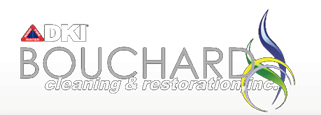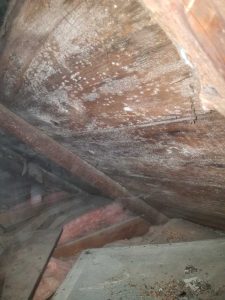How fast does mold grow?
A rainy summer means more mold.
How fast does mold grow? To understand how fast mold can grow, we should start with how and why mold can grow and how to prevent it.
Water, temperature, and humidity.
Check, check, and check all three this summer here in Maine. Mold spores come in on our clothes and shoes, and are even found in a typical dust sample. Mold simply needs the right conditions to grow. Add in a roof leak, a water line leak, a bad hot water tank, or even poor landscaping to give mold the moisture it needs to thrive.
How fast can mold grow?
Mold can grow within a day under the right conditions, so quick action when discovering water intrusion is key. Mold species come in many variations. Colors can vary from black, orange, and white to purple. Mold is not always immediately visible. Mold can grow in attics, ductwork, under mattresses, or inside walls. You may notice a musty odor, or experience cold-like symptoms.
What do I do if I think I have mold in my home?
- The first concern is to learn where the additional moisture came from that allowed the mold to grow. Once that is fixed, then remediation can be done
- If you can see the area, and it is smaller than 10 square feet, you may be able to take care of it yourself.
- Situations vary so much that it would be hard to give a solution without more information, so it is always best to talk with a specialist such as Bouchard Cleaning & Restoration.
- Companies that perform quality air testing can tell you what types of mold are present and the numbers relative to the outdoors, meaning that you want your indoor levels to be less than outdoors.
How much does mold remediation cost?
Mold remediation can vary depending on the size of the affected area and the complexity of the issue. It costs much less than the damage that could result from not taking action for both the structure and human health. A simple inspection can help to identify why it is growing, and what needs to be done to remediate it.
How do I prevent mold?
Preventing mold from growing requires keeping humidity in check.
- Keep surfaces dry and clean.
- Avoid using carpet in damp areas such as basements and bathrooms.
- Use mold-resistant products in bathrooms and basements.
- Use a dehumidifier to reduce excess moisture.
- Clean up water spills as soon as possible.
Can I use bleach to clean up mold?
Bleach does not kill mold. Bleach simply lightens the appearance of mold giving you the false pretense that you have taken care of the issue. The bottom line with mold is that the best advice is to remove the affected materials. Sheetrock is a porous material which is an issue because mold can root itself. This means that even if you wipe down the mold, it can come back the next time there is any excess moisture in that area, which is why removal is the best course of action. If it is a non-porous surface then simply washing the area will do.
Have more questions? Call Bouchard Cleaning & Restoration to speak with members of our team. www.bouchardcleaning.com











